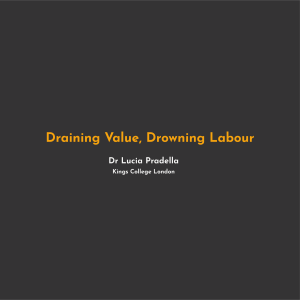
7K
Downloads
32
Episodes
Sociology is based on a conventional view of the emergence of modernity and the ‘rise of the West’. This privileges mainstream Euro-centred histories. Most sociological accounts of modernity, for example, neglect broader issues of colonialism and empire. They also fail to address the role of forced labour alongside free labour, issues of dispossession and settlement, and the classification of societies and peoples by their ‘stages of development’. The Connected Sociologies Curriculum Project responds to these challenges by providing resources for the reconstruction of the curriculum in the light of new connected histories and their associated connected sociologies. The project is designed to support the transformation of school, college, and university curricula through a critical engagement with the broader histories that have shaped modern societies.
Episodes

Tuesday Jul 27, 2021
Draining Value, Drowning Labour - Dr Lucia Pradella
Tuesday Jul 27, 2021
Tuesday Jul 27, 2021
How much did the British gain from their empire? According to some calculations, Britain drained a total of nearly $45 trillion from India alone between 1765 and 1938: seventeen times more than the total annual GDP of the UK today. This huge amount of wealth was transferred unilaterally from India to England via trade, banking and administrative mechanisms. While India got nothing in return, the colonial drain played an important role in both the so-called primitive accumulation of capital in England and the reproduction of its industrial system. Only part of this wealth was reinvested in India, and in a way that kept India in a subordinate position within the British colonial empire. This lecture will look at the early theorizations of the colonial drain and discuss the importance of understanding it as part of the overall development of the global capitalist system. Crucially, processes of colonial extraction and dispossession pushed more and more people into the reserve army of English capital, forcing them to emigrate either to other British colonies, as in the case of India, or to England itself, as in the case of Ireland. But does this framework still hold true today, when formal colonial empires seem to be closing their borders to prevent immigration, at huge human cost? Looking beyond the surface of European rhetoric of border controls and its presence in Africa reveals the enduring presence of processes of colonial extraction – of both wealth and labour.
Reading
- Hamza Hamouchene (2019), Extractivism and Resistance in North Africa, Transnational Institute
- Karl Marx (1988), On Ireland - Marx to Sigfrid Meyer and August Vogt. April 1870. In Collected Works 43 – Marx and Engels: 1868-1870. Lawrence & Wishart, pp. 471-476
- Utsa and Prabhat Patnaik (2016), A Theory of Imperialism, Columbia University Press
- Lucia Pradella and Rossana Cillo (2020) Bordering the surplus population across the Mediterranean: Imperialism and unfree labour in Libya and the Italian countryside. Geoforum
- Ajai Sreevatsan (2018), British Raj siphoned out $45 trillion from India: Interview to Utsa Patnaik Mint
- Harsha Walia (2014), Undoing Border Imperialism, AK Press
Resources
- Exodus – Escape from Libya, episode 0 (2018)
- Global Social Theory -Utsa Patnaik
Questions for Discussion
- What is the colonial drain?
- What is the link between colonial/neo-colonial drain and migration?
- What light does situating borders within broader imperialist dynamics shed on the so-called ‘migration crisis’ in Europe?
- How do immigrants describe their experience of detention and forced labour in Libya?

No comments yet. Be the first to say something!